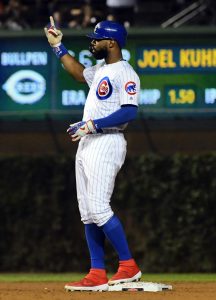The Dodgers announced Thursday that they’ve signed free-agent outfielder Jason Heyward to a minor league contract and invited him to Major League Spring Training.
The Cubs released Heyward earlier this offseason. He’d been slated to head into the 2023 campaign in the final season of his eight-year, $184MM deal signed prior to the 2016 campaign. Chicago remains on the hook for the bulk of Heyward’s $22MM salary in 2023, and the Dodgers will only owe him the prorated league minimum for any time spent on their Major League roster or injured list. That sum would be subtracted from the $22MM owed by the Cubs.
Heyward, still just 33, spent seven seasons with the Cubs but struggled to live up to the expectations of that contract. After hitting .293/.359/.439 with all-world defense in his lone season as a Cardinal prior to reaching the open market, Heyward hit just .230/.306/.325 in the first season of his eight-year deal. The Cubs won the World Series that year, with the final victory famously preceded by a spirited clubhouse speech from Heyward during a rain delay. That makes for a good anecdote but ultimately does little to overshadow a generally underwhelming tenure with the Cubs.
Heyward posted above-average offensive numbers with the Cubs only in the 2019 season and in the shortened 2020 campaign, when he combined for a .255/.355/.435 output in 770 plate appearances. That solid run was bookended by a total of five sub-par seasons at the plate, though, and Heyward’s final batting line as a member of the Cubs clocked in at just .245/.323/.377. He provided plus defense, value on the bases and was clearly an important figure in the clubhouse, but there’s no getting around the fact that the contract didn’t pan out anywhere close to how either party hoped. By measure of wins above replacement, Heyward gave the Cardinals nearly as much value in 2015 (5.6 fWAR, 6.8 bWAR) as he gave the Cubs over a seven-year period from 2016-22 (8.2 fWAR, 8.9 bWAR).
The Dodgers will hope that a change of scenery, some different coaching and some input from a different data/analytics team might be able to help Heyward tap into some semblance of his old self. Righting this ship will be a tall order, as Heyward’s once-elite defensive grades have dwindled down to nearly average. Heyward still possesses a strong arm, but he was never a burner in the first place and Statcast ranked his 2022 sprint speed in the 44th percentile of big leaguers.
Heyward won’t be guaranteed anything more than an opportunity with the Dodgers, who’ll be able to cut him loose at any point in camp if they wish to allocate his Cactus League at-bats to younger options. That said, there’s at least some degree of an opportunity for him, at least as things currently stand with the L.A. roster. Having non-tendered Cody Bellinger and lost Trea Turner to the Phillies via free agency, the Dodgers currently have some unsettled spots in the lineup. For now, Chris Taylor seems likely to move from left field to second base, with Gavin Lux sliding to shortstop. That creates some more fluidity in an outfield mix that right now might contain both Trayce Thompson and 25-year-old rookie James Outman.
There will certainly be more moves on the horizon for the Dodgers, whether they pivot and make a play for Dansby Swanson at shortstop — they’re reportedly not pursuing Carlos Correa — or whether they bring in some new talent to deepen the outfield mix. Any subsequent additions could serve to further limit Heyward’s chances, but there’s little harm in bringing him to camp this spring and seeing if they can conjure up yet another successful reclamation project.
 Unfortunately, Heyward’s production slumped immediately. After hitting .293/.359/.439 with the Cardinals in 2015, he produced a batting line of .230/.306/.325 in 2016. While the former line amounted to a wRC+ of 121, or 21% above league average, his first year as a Cub resulted in a wRC+ of just 72, or 28% below league average. In spite of the down year from Heyward, the Cubs went 103-58, winning the Central by 17 1/2 games over the Cardinals. Heyward’s bat was even worse in the playoffs, as he hit just .104/.140/.167. Regardless, the Cubs went on to break their century-old curse by winning the World Series. Despite Heyward’s poor on-field results, he supposedly contributed by rousing the club’s spirits with a rain delay speech in Game 7 against Cleveland, though Cub fans can debate among themselves how much credit he deserves for that.
Unfortunately, Heyward’s production slumped immediately. After hitting .293/.359/.439 with the Cardinals in 2015, he produced a batting line of .230/.306/.325 in 2016. While the former line amounted to a wRC+ of 121, or 21% above league average, his first year as a Cub resulted in a wRC+ of just 72, or 28% below league average. In spite of the down year from Heyward, the Cubs went 103-58, winning the Central by 17 1/2 games over the Cardinals. Heyward’s bat was even worse in the playoffs, as he hit just .104/.140/.167. Regardless, the Cubs went on to break their century-old curse by winning the World Series. Despite Heyward’s poor on-field results, he supposedly contributed by rousing the club’s spirits with a rain delay speech in Game 7 against Cleveland, though Cub fans can debate among themselves how much credit he deserves for that.